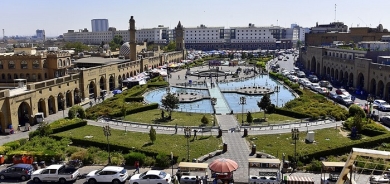Egypt’s parliament to probe foreign NGO workers’ departure

Saad al-Katatni said parliament would summon officials to explain the decision and “hold accountable those responsible for this crime, which represented a blatant intervention in the affairs of Egypt’s judiciary.”
After months of pressure from Washington, about 15 of the foreign defendants including Americans were allowed to fly out of Cairo airport on Thursday after posting bail, sparking outrage in Egypt.
“We cannot accept any type of foreign intervention in Egypt’s affairs,” Katatni, an Islamist, told a joint session of parliament and the senate. “This case cannot be ended with a political decision.”
The trial, in which the activists were accused of receiving illicit foreign funds to operate unlicensed NGOs, caused a crisis in relations between the United States and its close Middle Eastern ally.
The case put at risk $1.3 billion in annual U.S. military aid to Egypt, a cash transfer that began flowing after Egypt made peace with Israel in 1979, and it marked the deepest rift in U.S.-Egyptian relations in decades.
Egyptian authorities had insisted they could not intervene in a judicial matter, but the trial, which opened last Sunday, began to unravel as the judges stepped aside and a travel ban on the defendants was lifted.
The foreigners were rushed through Cairo airport on to a private plane after having each posted bail of two million pounds (around $330,000 or 247,000 euros).
The official Al-Ahram newspaper said the judges recused themselves after they were requested to lift the travel ban, outraging Egyptians across the political spectrum at alleged political interference.
A new panel of judges to try the case is expected to be announced on Saturday, but the Cairo appeals court head, Abdel Moez Ibrahim, has suggested a misdemeanor court may take over the proceedings.
The defendants had been charged under the penal code, which could have led to jail sentences of up to five years.
Bail by U.S.
Meanwhile, the bail paid for U.S. pro-democracy activists facing charges in Egypt ultimately came from the U.S. government, the State Department said on Friday.
The travel ban was lifted this week and the U.S. State Department on Friday said 13 foreign workers ̶ six of them U.S. citizens ̶ had left Egypt on a private plane. The amount of bail paid for the U.S. citizens was set at about $330,000 each.
Out of a total of 43 foreign and Egyptian workers who have been charged in the case, 16 were U.S. citizens and seven of those were in Egypt and had been subject to the travel ban. One of the seven chose to remain in Egypt, State Department spokeswoman Victoria Nuland told reporters.
The State Department declined to name the people, some of whom worked for the IRI and the National Democratic Institute, U.S.-funded nongovernmental organizations that seek to promote democracy abroad.
Nuland said the money to pay the bail ultimately came from the U.S. government, saying that the Obama administration had agreed to treat the legal expenses stemming from the incident “as part of the activities that the U.S. government funds.”
“The NGOs paid the bail out of money that they received from the U.S. government,” she said.
“We agreed to this because the situation arose in the context of the democracy promotion work that they were doing that we had funded and supported.”
Nuland said that it was up to the U.S. citizens who had left to decide whether to return to Egypt to face the charges.
She was unable to say whether the money would be forfeited to the Egyptian government if they did not, or whether the money would be returned to the NGOs or to the U.S. government if they return to stand trial.
“Our hope and expectation is that we can get this case dismissed,” she said, saying that if it was dismissed the questions about the bail would “presumably” be resolved.
AL ARABIYA














